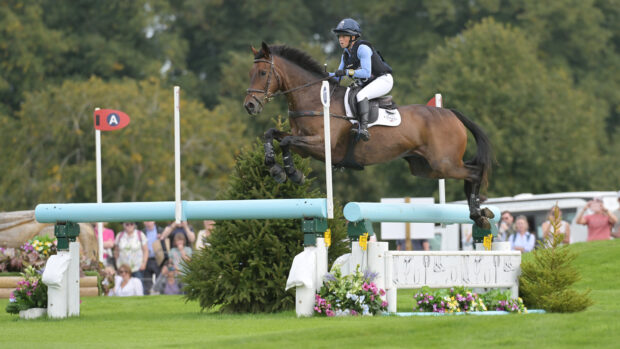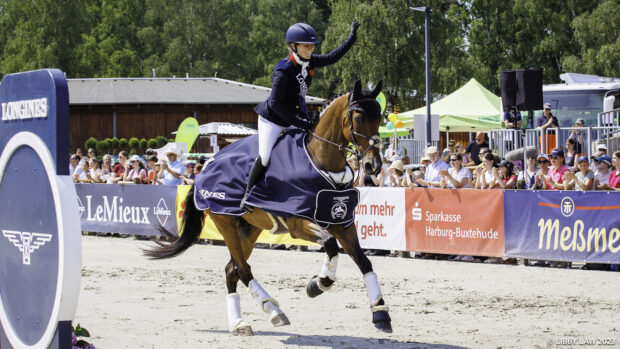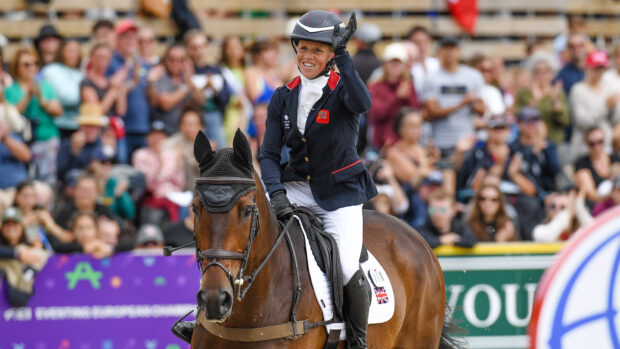Competitors have been sharing their reactions after walking the 2024 Paris Olympics cross-country course, which is designed by French course-designer Pierre Le Goupil. So here is the lowdown on the fences on the Paris Olympics eventing cross-country course that the riders think are likely to determine who wins the Olympic eventing medals.
British pathfinder Tom McEwen echoes many rider’s sentiments in saying it is a “well-designed” and “beautiful” track.
“I think it’s a fantastic course. If I compare it to Tokyo, it’s slightly different with the ideas and questions, but I think it very cleverly opens you out,” he explains. “There’s galloping areas – it’s not just twisty – but I think at the end is when you’re going to slightly get caught out as there’s lots of twists and turns, not just fences.
“I see the optimum time being quite tight, and I think it will be intense to ride – I’d compare it to a nine-minute version of Luhmühlen.”
One fence that sticks out in Tom’s mind is the second water complex at fence 10 – The Vauban Citadel (pictured top).
“For me, I think it’s a big question. It’s a big jump in over the direct route and it’s at the highest point of the course,” he explains. “Then I think there’s a few different questions elsewhere and I think it will be an accumulation of effort for horses and riders. You could build the easiest course in the world, but it is the Olympics, and people will make some mistakes.”
Tom’s teammate and dressage leader Laura Collett says that there has been “a lot of head scratching” due to the number of combinations and options available.
“There’s a lot of options at fence 10 and we haven’t seen a shape of fence like the jump into the water before, plus it’s at the top of a long uphill pull,” she continues. “To be honest, I think it’s like any other cross-country course in that you’ve got to be on your A game from start to finish and you’re not home until you’ve gone through the finish flags.”
Ros Canter, who is anchor rider for the British team agrees with Laura in that “there’s plenty to jump”.
“The time is going to be a big factor and that’s where mistakes creep in. I’ve got a plan – I’m open to that plan changing, but I’m going to try and stay in my bubble,” she states.
Germany’s Michael Jung thinks the continued rain that the area has experienced over the past 24 hours will be “good for the ground”.
“When I first looked at the course a couple of days ago, I thought that the ground was maybe a bit hard in places,” he continues. “We have not much experience here, but my feeling is that cross-country will be amazing.”
Paris Olympics cross-country course: “It’s very clever”
Michael’s compatriot and reigning individual Olympic champion Julia Krajewski says that the course “shouldn’t be underestimated”.
“It’s very clever. I think if you ride forward and bravely and have an honest horse, you probably will do well,” she concludes.
Switzerland’s Felix Vogg was another to comment on the beautifully presented track, but with an interesting word of caution.
“It’s the prettiest course I have ever seen – I think it’s maybe a little bit too pretty and everyone feels comfortable. If a rider is on their line, maybe they’ll be lulled into forgetting how to ride a little bit,” he explains. “If you are not really focused and riding like it’s a cross-country, I think it will be tough.”
Ireland’s Austin O’Connor said to keep an eye out on ground conditions, owing to the heavy rain.
“The ground is getting soft and it’s certainly going to change the complexion of the competition – hopefully the blood horses will come to the fore,” he says. “Pierre Le Goupil is a very, very clever course designer – fair, but clever.
“It’s quite intense and it’s going to be quick, but you will need to have enough petrol. I think from seven minutes onwards it will be interesting with the riders that are having a real go. ”
Austin pinpoints fences 5abc and 7ab – The Ménagerie Pond and The Ulysees’ Companions – as jumps to look out for.
“The water at five will sort people out early on the course and fence seven, which is a step up to a rail, will either fill horses with confidence or suddenly have them thinking early on. I think from the word go, it’s all got to be respected,” he states.

Switzerland’s Robin Godel suggests that the time will be “difficult” to achieve and that people should keep an eye on the final water, The Etoile Royale Waters, at fence 23abcd.
“The angle is not so easy to ride at this fence and it comes after the eighth minute. We have to pay attention to the end and be on a good line and also, when the horse is a bit tired and long, we have to react and be ready.”
Jonelle Price, who is riding in her fourth Olympics for New Zealand, says that Pierre’s job as course designer for this Olympics is “not an easy brief”.
“Where you’ve got the world’s best combinations, but also some of the lesser nations as well – that can be tricky, but I think he’s done a really good job. There are some things we haven’t really seen before and Pierre has been creative. The dimensions are fair and you can make up some time in the third minute, but that’s about the only place you can on this course – during the second minute, I think there’s seven jumping efforts and it will be about minimising the damage to your time in those busy patches.”
- To stay up to date with all the breaking news throughout the Olympic Games, Royal International Horse Show and more, subscribe to the Horse & Hound website
You might also be interested in:

Chic, charming and fabulously French: the inside story on the Paris Olympic cross-country

‘A track for brave riders and fast, reactive horses’: Paris Olympics cross-country course-designer on the challenge ahead

It’s time! First look at every fence on Paris Olympic cross-country course in Versailles

Subscribe to Horse & Hound magazine today – and enjoy unlimited website access all year round




